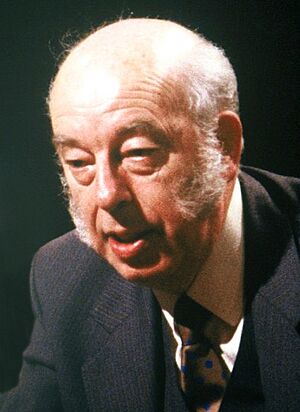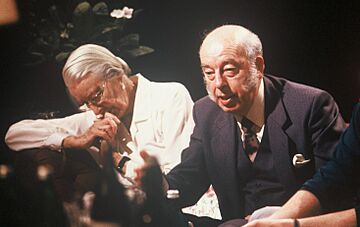Rhodes Boyson facts for kids
Quick facts for kids
Rhodes Boyson
|
|
|---|---|

Boyson on After Dark in 1989
|
|
| Minister of State for Local Government | |
| In office 10 September 1986 – 13 June 1987 |
|
| Prime Minister | Margaret Thatcher |
| Preceded by | William Waldegrave |
| Succeeded by | Michael Howard |
| Minister of State for Northern Ireland | |
| In office 11 September 1984 – 10 September 1986 |
|
| Prime Minister | Margaret Thatcher |
| Preceded by | The Earl of Mansfield |
| Succeeded by | Nicholas Scott |
| Minister of State for Social Security | |
| In office 13 June 1983 – 11 September 1984 |
|
| Prime Minister | Margaret Thatcher |
| Preceded by | Hugh Rossi |
| Succeeded by | Tony Newton |
| Parliamentary Under-Secretary of State for Education and Science | |
| In office 7 May 1979 – 12 June 1983 |
|
| Prime Minister | Margaret Thatcher |
| Preceded by | Margaret Jackson |
| Succeeded by | Bob Dunn |
| Member of Parliament for Brent North |
|
| In office 28 February 1974 – 8 April 1997 |
|
| Preceded by | Constituency established |
| Succeeded by | Barry Gardiner |
| Personal details | |
| Born |
Rhodes Boyson
11 May 1925 Haslingden, Lancashire, England |
| Died | 28 August 2012 (aged 87) Harefield, London, England |
| Political party | Conservative |
| Other political affiliations |
Labour (before 1964) |
| Spouses |
Violet Burleston
(m. 1946; div. 1971)Florette MacFarlane
(m. 1971) |
| Children | 2 (by Burleston) |
| Military service | |
| Allegiance | |
| Branch/service | |
Sir Rhodes Boyson (born May 11, 1925 – died August 28, 2012) was an English educator and writer. He also became a well-known politician for the Conservative Party. He served as a Member of Parliament (MP) for an area called Brent North. In 1987, he received the title of Knight and became a member of the Privy Council. This meant he could advise the King or Queen.
Contents
Early Life and Education
Rhodes Boyson was born in a town called Haslingden in Lancashire, England. His father worked in a cotton factory and was also a local leader. Rhodes went to Haslingden Grammar School. After that, he studied at several universities. These included University College Cardiff, the University of Manchester, the London School of Economics, and Corpus Christi College, Cambridge.
In 1967, he earned a special degree called a PhD from London University. His research was about a cotton manufacturer from the Victorian era named Henry Ashworth. This research was later published as a book.
Early Career and Views
During the end of the Second World War, Rhodes Boyson served in the Royal Navy. He was stationed in India around the time India gained its independence. From his late twenties, he was also a lay preacher for the Methodist church.
Becoming a Teacher and Head Teacher
Boyson started his career as a teacher in 1950. Later, he became a head teacher at different schools.
- From 1955 to 1961, he led Lea Bank Secondary Modern School.
- From 1961 to 1966, he was head of Robert Montefiore Secondary School in London.
- From 1967 to 1974, he was the first head teacher of Highbury Grove School. This was a new all-boys' comprehensive school in North London.
As a head teacher and later as an MP, he strongly supported keeping corporal punishment (like caning) in British schools. He believed in strict rules and discipline. At Highbury Grove, he brought in traditional rules. These included strict uniforms and caning for bad behavior. He also introduced a house system where students were divided into groups. He said that these changes made the school very popular with parents.
Shift in Political Views
From 1957 to 1961, Boyson was a local council member for the Labour Party in Haslingden. His father was also a Labour leader there. However, Boyson left the Labour Party in 1964. Three years later, he joined the Conservative Party.
He explained that his change in views came from his studies of the cotton industry. He learned about people who believed that a free economy was good for everyone. They thought it would bring prosperity and social harmony.
In 1977, he helped write a series of papers called the Black Papers on education. These papers criticized many parts of the comprehensive school system. He also spoke out against what he called "mindless sociologists." He believed their ideas were harming society.
Parliamentary Career
After trying to become an MP in 1970, Rhodes Boyson was first elected to the House of Commons in February 1974. He represented Brent North.
He held several important government roles:
- From 1979 to 1983, he was a junior minister at the Department of Education and Science.
- From 1983 to 1984, he was Minister of State for Social Security.
- From 1984 to 1986, he was Minister of State for Northern Ireland.
- From 1986 to 1987, he was Minister of State for Local Government.
Boyson was a strong supporter of Section 28, a law that limited the discussion of certain topics in schools.
He was also a supporter of the Conservative Monday Club. He often spoke at their meetings. In 1991, he gave a speech about education at a Conservative Party conference.
Boyson also appeared on several TV shows. These included the BBC panel show Have I Got News for You and Brass Eye. He was also one of the first people interviewed by the comedian Ali G.
In the 1997 election, Boyson lost his seat in Brent North. This was partly because people felt he did not do enough to save Edgware General Hospital.
Personal Life
Rhodes Boyson was known for his distinctive mutton chop whiskers and strong accent from Lancashire. He started growing his whiskers after students joked about his short hair while he was a headmaster.
In 2007, he received an honorary degree from the University of Buckingham.
Boyson married Violet Burletson in 1946. They had two daughters. They divorced in 1971. He then married Florette MacFarlane, who was also a teacher. They lived in Pinner, London. Rhodes Boyson passed away in 2012 at the age of 87.
Images for kids
 | Bayard Rustin |
 | Jeannette Carter |
 | Jeremiah A. Brown |




